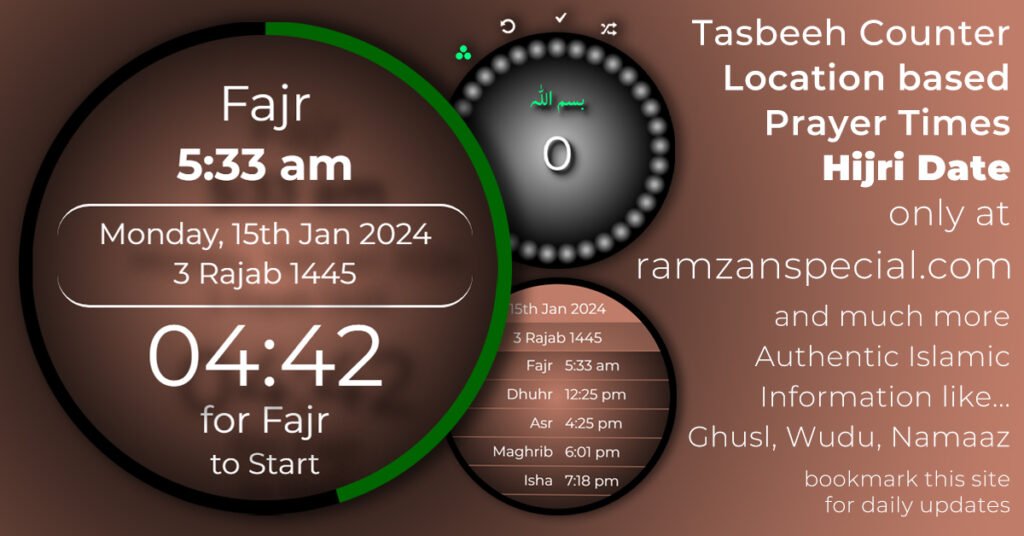Ensure you don’t overlook vital aspects of essential Islamic knowledge that everyone should know. Explore clear and authentic instructions for Ghusl (ritual bath), Wuzu (ablution), and Namaaz (prayer) in multiple languages. Additionally, discover Location-based Prayer Times, Tasbeeh Counter and Hijri Date. It is a must-read and learn knowledge for everyone.
A Spiritual Adventure
Overview:
Welcome to RamzanSpecial.com, your go-to place for a simple and insightful journey through Ramadan 2024. Join us as we explore the core practices and traditions that make this month special. From prayer times to the significance of fasting, our aim is to be your friendly companion on this spiritual adventure.
The Heart of Ramadan:

Understanding Worship (Ibadah)
Let’s start by talking about the heart of Ramadan – worship, or “Ibadah” in simpler terms. Learn how prayer, fasting, and acts of kindness during this month help us become better individuals. Discover how these practices teach us self-discipline and connect us with something greater than ourselves.
The essence of Ramadan lies in the profound practice of worship, known as “Ibadah.” In this sacred month, Muslims around the world engage in various acts of devotion, creating a spiritual tapestry that binds individuals to a higher purpose. Let’s embark on a journey to understand the heart of Ramadan by delving into the significance of Ibadah, exploring its components, and discovering the transformative power it holds.
The Significance of Ibadah in Ramadan:
At its core, Ibadah encompasses a range of spiritual activities, each designed to draw individuals closer to Allah and foster a sense of piety. These acts include daily prayers, recitation of the Quran, acts of charity, and fasting from dawn to sunset. Ibadah is not merely a ritualistic routine; rather, it serves as a means of self-discipline, purification, and a connection with the divine.
Daily Prayers as a Form of Ibadah:
One of the foundational elements of Ibadah during Ramadan is the performance of daily prayers, known as Salah. Muslims are required to perform five prayers each day, and during Ramadan, the emphasis on these prayers intensifies. The act of bowing and prostrating in prayer symbolizes humility and submission, as individuals express their gratitude and seek forgiveness.
Recitation of the Quran:
The Quran, the holy book of Islam, is a central aspect of Ibadah during Ramadan. Believers engage in the recitation of Quranic verses, reflecting on its profound messages. Many strive to complete the entire Quran during the month, with the belief that the revelations hold guidance and blessings that are particularly potent during this sacred time.
Acts of Charity (Zakat and Sadaqah):
Charitable acts form an integral part of Ibadah during Ramadan. Muslims are encouraged to engage in acts of kindness, compassion, and generosity. This includes paying Zakat, a mandatory form of almsgiving, and Sadaqah, voluntary acts of charity. These practices not only fulfil a religious obligation but also contribute to the welfare of the less fortunate, fostering a sense of community and empathy.
Fasting as a Transformative Ibadah:
Central to Ramadan is the practice of fasting, or Sawm. From dawn to sunset, Muslims abstain from food, drink, and sinful behavior. Fasting goes beyond a physical act; it is a form of self-discipline that trains individuals to control their desires, cultivate empathy for the less fortunate, and develop a heightened awareness of their spiritual connection with Allah.
The Transformative Power of Ibadah:
The consistent engagement in Ibadah during Ramadan has a transformative impact on individuals. It shapes character, instills discipline, and nurtures a deep sense of spirituality. The regularity of these practices creates a rhythm of devotion that extends beyond the month itself, influencing daily life and fostering a lasting connection with Allah.
In essence, Ibadah during Ramadan is a holistic approach to spiritual growth. It encompasses prayers that reflect humility, the recitation of the Quran that imparts wisdom, acts of charity that express compassion, and fasting that instills self-discipline. As Muslims engage in these acts of devotion, they embark on a journey of self-discovery, drawing closer to their faith and experiencing the profound beauty of Ramadan. The heart of Ramadan beats with the rhythmic cadence of Ibadah, guiding believers toward a deeper connection with Allah and a more enriched spiritual existence.
Timekeeping in Ramadan:
Exploring the Hijri Date

Next, let’s look at the Islamic calendar and its role in determining the start and end of Ramadan – the Hijri date. Understand how this lunar calendar connects us with traditions from the past, making our spiritual journey more meaningful and rooted in history.
Navigating the spiritual journey of Ramadan goes beyond the physical acts of worship; it involves a connection with timekeeping traditions deeply rooted in Islamic history. In this exploration, we delve into the significance of the Hijri date during Ramadan, understanding its role in shaping the rhythm of this sacred month and fostering a connection with the lunar calendar.
The Essence of Timekeeping in Ramadan:
Ramadan operates on a unique calendar, the Hijri or Islamic lunar calendar. Unlike the Gregorian solar calendar, the Hijri calendar is based on the phases of the moon. This lunar cycle lends a distinct flavor to the observance of Ramadan, making the Hijri date a crucial aspect of timekeeping during this sacred month.
Understanding the Hijri Date:
The Hijri date holds a special place in the hearts of Muslims worldwide. It marks the beginning of Ramadan and determines the end of the month, signaling the celebration of Eid al-Fitr. The Hijri calendar follows the lunar cycles, with each month beginning with the sighting of the new moon. This lunar connection adds a celestial dimension to the passage of time during Ramadan, emphasizing the connection between the spiritual and natural worlds.
Historical Significance of the Hijri Date:
The adoption of the Hijri calendar dates back to the early days of Islam, specifically during the time of Prophet Muhammad (peace be upon him). The migration from Mecca to Medina, known as the Hijra, marked the commencement of the Islamic calendar. Ramadan, being the ninth month, holds historical significance, as it was during this month that the first verses of the Quran were revealed to Prophet Muhammad.
By following the Hijri date, Muslims worldwide commemorate the events of the Hijra, emphasizing the historical roots of their faith. This connection with the past enhances the spiritual experience of Ramadan, grounding the observance of this month in the rich tapestry of Islamic history.
Impact of the Hijri Date on Ramadan Traditions:
The Hijri date plays a pivotal role in determining the start and end of daily fasting, as well as the specific nights for increased prayers, such as Laylat al-Qadr. Laylat al-Qadr, or the Night of Power, is believed to be the night when the Quran was first revealed and is considered more spiritually significant than a thousand months. Muslims seek this blessed night in the last ten days of Ramadan, guided by the lunar phases that mark the Hijri calendar.
The lunar connection also influences the calculation of Zakat, the obligatory almsgiving, which is typically due at the end of Ramadan. Muslims, guided by the Hijri date, contribute to charitable causes, reinforcing the connection between timekeeping, spirituality, and social responsibility during this sacred month.
Fostering a Deeper Connection:
Exploring the Hijri date during Ramadan fosters a deeper connection with the broader Islamic community. Muslims around the world share a unified experience, synchronized by the lunar calendar. This shared observance creates a sense of unity, as believers collectively engage in acts of worship, reflection, and community service guided by the phases of the moon.
Prayer Times:
Finding Peace in the Rituals
Now, let’s explore the daily prayer times during Ramadan. Discover the peace that comes with aligning your day around these moments of reflection. Learn how incorporating these times into your routine can bring a sense of calm and spirituality to your everyday life.
In the sacred month of Ramadan, one of the most spiritually enriching practices is the observance of prayer times. Muslims engage in a rhythmic and harmonious routine of daily prayers, known as Salah or Salat, to find peace, connection, and solace in the rituals. In this exploration, we delve into the profound significance of prayer times during Ramadan, understanding how they offer a sense of tranquility, spiritual connection, and a constant reminder of devotion.
The Ritual of Daily Prayers:
At the heart of Islamic worship lies the practice of daily prayers, a fundamental pillar of the faith. Muslims are required to perform five prayers each day, and during Ramadan, these prayers take on heightened significance. The five daily prayers are Fajr, Dhuhr, Asr, Maghrib, and Isha, each occurring at specific times of the day and forming a crucial part of the believer’s spiritual routine.
Fajr: The Dawn Prayer:
The day begins with Fajr, the dawn prayer, before sunrise. This early morning ritual symbolizes the awakening of the soul and the start of a new day in devotion to Allah. Performing Fajr during Ramadan takes on added importance, setting the tone for the day ahead and initiating the fast that will last until sunset.
Dhuhr: The Midday Prayer:
Dhuhr, the midday prayer, occurs after the sun has passed its zenith. This prayer serves as a pause in the day, a moment to reflect, express gratitude, and seek guidance. In the midst of daily activities, Dhuhr provides a spiritual anchor, reminding believers of the divine presence that permeates every aspect of their lives.
Asr: The Afternoon Prayer:
Asr, the afternoon prayer, takes place in the late afternoon, signifying the gradual transition from day to evening. This prayer is a moment of renewal and reconnection, allowing believers to seek strength and patience as they navigate the challenges of the day. As the sun begins its descent, Asr becomes a beacon of hope and perseverance.
Maghrib: The Sunset Prayer:
Maghrib is the prayer offered just after sunset, marking the end of the day’s fast during Ramadan. This ritual holds special significance as it symbolizes the breaking of the fast, often accompanied by a communal meal known as iftar. Maghrib is a moment of gratitude, reflection, and communal bonding, as families and communities come together to share the blessings of the day.
Isha: The Night Prayer:
The day concludes with Isha, the night prayer, performed after the twilight has faded. Isha is a time for introspection, seeking forgiveness, and acknowledging the day’s accomplishments and shortcomings. The peacefulness of the night prayer provides a serene closure to the day, preparing the believer for a restful night and a new cycle of devotion.
The Spiritual Significance of Prayer Times in Ramadan:
Prayer times during Ramadan hold immense spiritual significance, serving as a continuous thread that weaves through the fabric of the month. These moments of devotion offer believers a respite from the hustle and bustle of daily life, allowing them to turn inward, reconnect with their faith, and find peace in the rituals.
Harmony with the Lunar Calendar:
The prayer times are intricately connected with the lunar calendar, aligning with the celestial rhythms that mark the passage of time. This connection emphasizes the harmony between the spiritual and natural worlds, fostering a deep appreciation for the divine order that governs both the heavens and the hearts of believers.
Balancing Spirituality and Daily Life:
The observance of prayer times in Ramadan reflects the seamless integration of spirituality into daily life. Muslims, regardless of their geographical location, share a synchronized experience of devotion as they align their daily routines with the prescribed prayer times. This harmonious balance serves as a reminder that spirituality is not confined to specific moments but is interwoven into every moment of one’s existence.
Finding Peace in the Rituals:
The act of performing prayers during Ramadan extends beyond a mere ritual; it is a source of peace and tranquility for believers. In the midst of a fast-paced world, prayer times provide a sanctuary for reflection, mindfulness, and a connection with the divine. The rhythmic nature of the daily prayers acts as a constant reminder of the presence of Allah, grounding believers in a sense of peace and purpose.
Ramzan 2024:
A Month of Reflection and Unity
Moving on, we’ll touch on the broader concept of Ramadan, sometimes referred to as “Ramzan.” This is a month of reflection, renewal, and community. Explore the joy of communal prayers, breaking fast together (iftar), and spreading kindness. Learn how these activities bring people together and create a sense of unity during this special time.
Ramzan 2024 heralds a month of profound reflection and unity, encapsulating the essence of Ramadan as a sacred period for Muslims around the world. In this exploration, we delve into the broader concept of Ramadan, known as Ramzan, shedding light on the cultural and communal aspects that make this month a unique and transformative experience.
Cultural Significance of Ramzan:
Ramzan is not merely a time of fasting and prayer; it is a holistic experience that extends beyond religious observance. Culturally, this month holds immense significance as families, communities, and societies come together to celebrate the values of compassion, self-discipline, and community spirit. The cultural tapestry of Ramzan weaves a narrative of shared traditions, rich heritage, and a collective commitment to spiritual growth.
Communal Prayers:
A central feature of Ramzan is the emphasis on communal prayers, fostering a sense of unity among Muslims. The Tarawih prayers, conducted during the nights of Ramadan, bring congregations together in mosques for prolonged and soulful worship. These prayers not only strengthen the bond between individuals and their faith but also create a palpable atmosphere of unity as believers stand shoulder to shoulder, sharing in the collective experience of devotion.
Iftar Gatherings:
Iftar, the evening meal that breaks the daily fast, is a cornerstone of Ramzan’s communal spirit. Families and communities come together at sunset to share this special meal, marking the end of the day’s fast. The act of breaking the fast becomes a shared experience, fostering a sense of togetherness and reinforcing the importance of gratitude and generosity. Iftar gatherings symbolize the communal nature of Ramzan, transcending cultural and geographical boundaries.
Acts of Kindness and Charity:
Ramzan is a month that amplifies acts of kindness and charity. Muslims engage in various charitable activities, driven by the spirit of giving and compassion. The concept of Zakat, the obligatory almsgiving, becomes more pronounced during this time, as individuals contribute to causes that uplift the less fortunate. The emphasis on charity underscores the communal responsibility to ensure that the blessings of Ramzan are shared with those in need.
Night of Power (Laylat al-Qadr):
The last ten nights of Ramzan are particularly significant, as they include Laylat al-Qadr, the Night of Power. It is believed to be the night when the Quran was first revealed to Prophet Muhammad. Muslims seek this blessed night for its immense spiritual value, engaging in increased acts of worship, prayer, and reflection. The communal pursuit of Laylat al-Qadr creates an atmosphere of shared devotion and spiritual seeking.
Cultural Traditions and Customs:
Ramzan is also characterized by a range of cultural traditions and customs that vary across regions. From special dishes prepared for iftar to the decoration of homes and public spaces, these customs contribute to the festive atmosphere of the month. Cultural traditions serve as a means of expressing shared identity, reinforcing the bonds that unite individuals during this special time.
Unity Amid Diversity:
One of the remarkable aspects of Ramzan is its ability to foster unity amid diversity. Muslims from different backgrounds, cultures, and traditions come together in a shared experience of fasting, prayer, and reflection. The universality of these practices transcends linguistic, ethnic, and geographical differences, creating a global sense of unity among the Muslim community.
The Magic of Fasting:
Spiritual Growth in Ramadan 2024
Lastly, let’s dive into the magic of fasting during Ramadan. Uncover the simple and powerful benefits of self-discipline, empathy, and gratitude. See how fasting goes beyond just abstaining from food – it’s a tool for personal growth that affects your mind, body, and soul.
Fasting during Ramadan is not merely a physical act of abstaining from food and drink; it is a transformative journey that encompasses spiritual growth, self-discipline, empathy, and gratitude. As we delve into the magic of fasting during Ramadan 2024, we uncover the profound layers of this practice, exploring its spiritual benefits, impact on the mind and body, and the science behind the transformative power it holds.
The Essence of Fasting in Ramadan:
Fasting, known as Sawm, is one of the Five Pillars of Islam, and during Ramadan, it takes on heightened significance. Muslims fast from dawn to sunset, refraining not only from food and drink but also from negative behaviors, thoughts, and actions. The act of fasting goes beyond a ritualistic observance; it is a conscious choice to engage in self-discipline, empathy, and spiritual reflection.
Spiritual Benefits of Fasting:
At its core, fasting in Ramadan is a spiritual endeavor. It serves as a means of drawing closer to Allah, fostering a heightened sense of consciousness and mindfulness. Through the act of abstaining, believers are reminded of their dependence on the divine, cultivating a deep sense of humility and gratitude. The spiritual benefits of fasting include increased self-awareness, a strengthened connection with one’s faith, and a purification of the soul.
Fasting also provides an opportunity for self-reflection and repentance. It becomes a time to reassess one’s priorities, seek forgiveness for past transgressions, and set intentions for personal growth. The act of refraining from physical nourishment becomes a metaphorical cleansing of the heart and soul, paving the way for a renewed spiritual journey.
Impact on Mind, Body, and Soul:
The magic of fasting extends beyond the spiritual realm, influencing the mind, body, and soul in profound ways. From a psychological perspective, fasting encourages mental clarity and focus. The intentional discipline required to adhere to the fast promotes mindfulness, creating space for introspection and heightened self-awareness.
Physiologically, the body undergoes various changes during fasting. As the digestive system gets a break from constant processing, the body enters a state of rest and repair. This can lead to detoxification, improved digestion, and a reset of metabolic processes. The physical discipline of fasting contributes to a holistic sense of well-being, aligning the mind and body in a journey of purification.
On a soulful level, fasting fosters empathy and compassion. Experiencing hunger and thirst cultivates a profound understanding of the struggles faced by those who are less fortunate. The act of willingly abstaining from food instills a sense of gratitude for the blessings of sustenance and creates a heightened awareness of the value of empathy in building a compassionate society.
Science Behind Fasting:
While fasting is deeply rooted in religious and spiritual traditions, modern science has also explored the physiological benefits of this practice. Intermittent fasting, a concept aligned with the Ramadan fast, has gained attention in scientific research for its potential health benefits.
During fasting, the body enters a state of ketosis, where it begins to utilize stored fat for energy. This metabolic shift can contribute to weight loss and improved metabolic health. Additionally, fasting has been associated with improved insulin sensitivity, reduced inflammation, and other markers of cardiovascular health.
The impact of fasting on the brain is a subject of interest in neuroscience. Some studies suggest that fasting may enhance brain function, promoting neuroplasticity and cognitive resilience. While the spiritual and mental benefits of fasting are subjective experiences, scientific investigations into the physiological changes during fasting provide additional layers to our understanding of its potential positive effects.
Self-Discipline and Personal Growth:
Fasting in Ramadan is a practice of self-discipline that extends far beyond the physical act of refraining from food. It involves cultivating a heightened awareness of one’s thoughts, behaviors, and interactions. The discipline required to adhere to the fast instills a sense of control over one’s impulses and desires, fostering personal growth and character development.
The commitment to fasting for an entire month requires dedication, resilience, and a conscious effort to overcome challenges. This journey of self-discipline contributes to the development of inner strength, willpower, and a greater sense of self-control. As individuals navigate the complexities of daily life while fasting, they uncover hidden reservoirs of strength and resilience, paving the way for personal growth and positive transformation.
Cultivating Gratitude and Appreciation:
Fasting creates a space for cultivating gratitude and appreciation for the blessings of life. As individuals experience the temporary deprivation of food and drink, they develop a profound awareness of the abundance that surrounds them. This heightened sense of gratitude extends beyond the material realm to encompass relationships, opportunities, and the gift of life itself.
The act of breaking the fast, known as iftar, becomes a moment of celebration and thanksgiving. Sharing a meal with family and friends after a day of fasting magnifies the joy of sustenance and nourishment. This practice of expressing gratitude during Ramadan extends to acts of kindness, charity, and compassion, creating a ripple effect of positivity within communities.
Conclusion:
As we conclude this comprehensive exploration of Ramadan 2024, we find ourselves immersed in the richness and diversity of this sacred month. From the profound significance of Ibadah to the exploration of the Hijri date, prayer times, cultural traditions in Ramzan, and the transformative magic of fasting, each facet contributes to a tapestry of spirituality, unity, and personal growth.
Ramadan, or Ramzan, is more than a religious observance; it is a holistic experience that transcends geographical and cultural boundaries. The practice of Ibadah, grounded in worship, prayer, and acts of charity, becomes a vehicle for spiritual elevation and self-discovery. Understanding the Hijri date adds a celestial dimension to timekeeping, emphasizing the historical roots that ground this sacred month.
Exploring prayer times reveals the harmonious balance between daily life and spirituality, with moments of reflection and devotion punctuating each day. Communal traditions and gatherings during Ramzan underline the cultural significance of this month, fostering unity amid diversity. Acts of kindness, charity, and the pursuit of Laylat al-Qadr contribute to the communal spirit that defines Ramadan.
The magic of fasting unfolds as a transformative journey, impacting the mind, body, and soul. It becomes a practice of self-discipline, cultivating empathy, and fostering personal growth. As individuals navigate the challenges of fasting, they uncover layers of gratitude and appreciation, creating a sense of unity that extends beyond the confines of religious affiliation.
In essence, Ramadan 2024 emerges as a time of reflection, unity, and personal and communal growth. The intertwining threads of spirituality, culture, and personal discipline create a mosaic that resonates with believers worldwide. Whether engaging in prayer, breaking fasts with loved ones, or practicing acts of kindness, individuals find themselves part of a global community united by shared values and a common journey towards self-improvement.
As we immerse ourselves in the multifaceted dimensions of Ramadan, may this exploration serve as a guide, fostering understanding, appreciation, and a shared sense of humanity. Ramadan extends an invitation to all, transcending differences and inviting individuals to embrace the universal principles of compassion, gratitude, and personal transformation.




